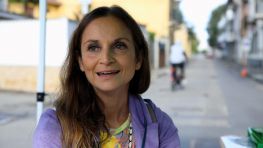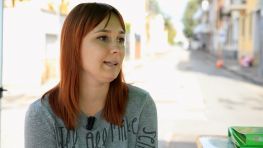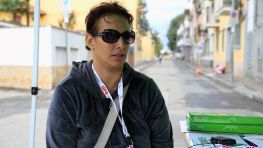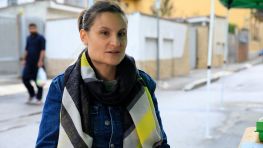 Elisa Di Tullio
Elisa Di Tullio Alessia Verri
Our liquid love
Alessia is an anthropologist who works as researcher, after working as a teacher for seven years. When she is 28, after about three of marriage, she decides together with her husband that it is their 'turn to become parents'. Alessia, who is therefore consciously pregnant, studies approaches to motherhood in depth, attends two antenatal courses, reads lots of books, but at the moment of the birth of her first-born, she feels that what she has learned and what has been explained to her is far removed from reality. She experiences intense post-partum depression, at times not understood by those around her, all of whom are astonished that motherhood destabilises her.
The path between mother, father and daughter nevertheless continues without major difficulties and the moment of despondency is overcome. The baby requires the breast a lot, she has some colic, a small problem with digestion and needs to feed constantly. As the hospital midwives had suggested, 'the more you breastfeed, the better', advice that Alessia decided to follow to the letter, dedicating herself totally to that 'liquid love' made of milk, looks and contact that is breastfeeding. Tiring but necessary, an important moment of affection and bodily union, with its symbiotic gestures and rituality that society struggles to understand: an all-embracing caring that creates a bond, that leaves a trace in the skin and in movements. On the strength of this awareness, Alessia decides to breast-feed her second daughter in the same way, despite the memory of the fatigue and pain that had driven her to buy a good dose of powdered milk 'in advance'. Which in the end she would never use, except after several months of exclusive breastfeeding.
Video table of contents
- First of all, I'm Alessia
- My first pregnancy
- What you can do to be "a good mother"
- The post-partum depression
- A hard challenge
- An empathic midwife
- Exhausting breastfeeding
- Our liquid love
- Food intolerances
- The second pregnancy
- She herself chooses to breast-feed
- it is not only nourishment
- My mother
- Everyone judges
- Breastfeeding and human relationships
- Breastfeeding is care
- Breastfeeding is awareness
Interview information
Country: IT
Region: Piemonte
City: Novara
Document by: Martina Riina
Video by: Luca Ghiardo, Martina Riina
Created: 27-05-2024
Questo video fa parte del seguente archivio
Breastfeeding: forms and practices of humanity
Breastfeeding: forms and practices of humanity
Breastfeeding is unanimously recognized by the main world health authorities as a fundamental health protection in the short, medium and long term for both the baby and the mother, offering biological, nutritional, emotional, relational and economic benefits.
The most important international scientific societies recommend giving the baby only breast milk for the first six months of life and subsequently accompanying the introduction of other foods with breastfeeding at least for the entire first year of the baby's life, but also up to two years and over if mother and child so wish.
This archive contains some testimonies of mothers and midwives aimed at deepening this theme by offering points of view anchored to individual experiences and sensitivities.






